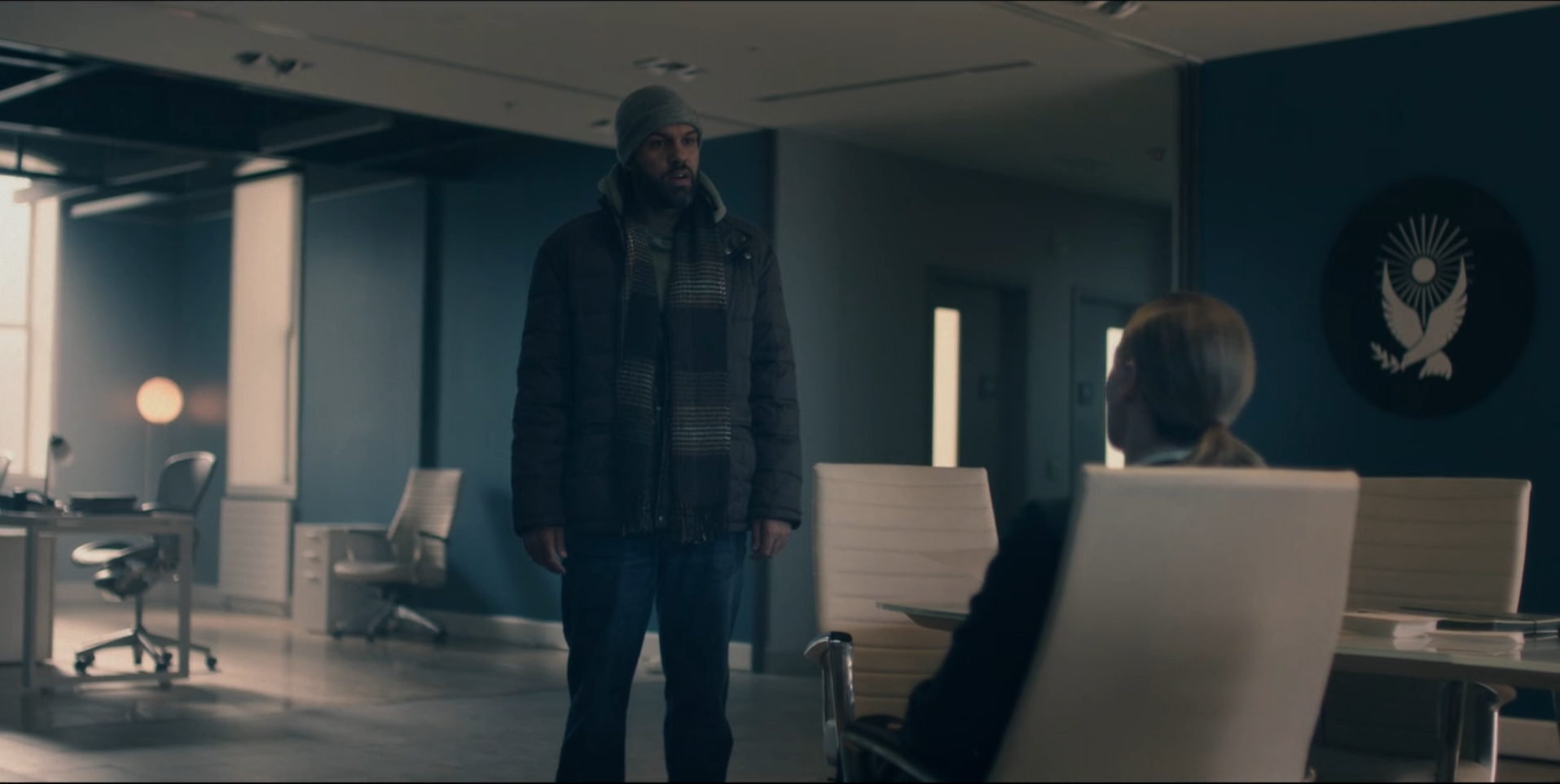Warning: this post contains spoilers for The Handmaid’s Tale Season 5 Episode 7
In the end of The Handmaid’s Tale season five episode seven, June goes from relief to shock in a matter of minutes. The sudden shift highlights one of the most important things that can be offered to a person who has experienced and is healing from trauma: choice.
Experiences of trauma, especially those including captivity, take away a person’s free will. To an outsider’s perspective, it can sometimes appear that a person has agency in these situations. The reality is, when the body perceives threat or danger, it responds automatically and instantaneously and doesn’t have the luxury to pause and consider every option—options that might be easier to see in retrospect or to a person not immediately under threat.
During a traumatic experience, the body will do whatever it believes is necessary to survive.
The way a person responds to a traumatic incident can also be influenced by coping mechanisms developed during childhood. An adult who learned as a child that being quiet and still was a way to stay safe, might freeze during a traumatic experience even when they have the ability to fight back or get away.
Prosecuting Rape
Part of why rape is so difficult to prosecute is because, until recently, most states required the victim to “resist to the utmost.” The updated law still sets an expectation that “resistance” be shown either physically or verbally.
A person who submits as a means of safety—because putting up a fight will only make things worse or further endanger their life—is dismissed for not showing sufficient resistance and therefore consenting to the experience.
We see this false logic and victim blaming play out in The Handmaid’s Tale season four episode eight when June provides testimony against Fred and Serena Waterford. Both Fred Waterford and his attorney push back, arguing that June chose to be a handmaid, knowing it would mean submitting to “the ceremony”—a form of ritualized rape—every month.

“Isn’t it true, Ms. Osborne, that you chose to become a handmaid?” Waterford’s defense attorney asks.
“It wasn’t much of a choice,” counters June. “It was either that or get sent to the colonies [where women are worked to death].”
The lack of agency June had while in Gilead—the fact that her only means of survival was submitting to captivity, torture, and rape—makes choice all the more important to her freedom.
Making Choices, Reclaiming Control
In season five, we see June make some very difficult choices—she chooses to turn herself into authorities after killing Fred Waterford, she chooses not to kill Serena outside the Gilead Information Center, she chooses to cross into No Man’s Land with hopes of getting more information about her daughter Hannah, and in episode seven, she chooses to help Serena Waterford give birth, then she chooses to get mother and child to safety.
The birth scene between June and Serena is a turning point.
In season five episodes five and six, Serena begins to understand what June and the other handmaids went through. While under constant surveillance at the Wheeler’s, she feels trapped, afraid, and completely out of control of her own life. She worries her child—the one thing most precious to her—is going to be taken away as soon as she gives birth. After just a few days in a situation that is only vaguely similar to what the handmaids in Gilead lived with for years, Serena is desperate enough to kill.
She is stripped down to nothing—no home, no husband, no means of escape, no power—and when she goes into labor on the side of the road in the middle of nowhere, she must rely on June—the woman who killed her husband and wished her child dead—to deliver her baby.
During the birth scene in the barn, we see June and Serena come together in a way they haven’t before—it’s tender and fierce and primal. They come together as mothers. And really, it’s been motherhood all along that has driven each of them to make the decisions they’ve made, however different those choices may have been.

After the birth experience, Serena and June become united in a sense, having witnessed and experienced the pain and joy of childbirth, of motherhood, together. They see each other in a new light. For the first time, Serena appears truly apologetic for what she’s done, for her hand in the creation of Gilead and the torture of June.
“Why didn’t you kill me?” Serena asks June, baby Noah cradled in her arms.
“I didn’t want to,” June says and sighs, as if speaking the words she’s realized them herself for the first time. She didn’t want to. So simple and yet so complex. A choice.
A Turning Point
June convinces Serena to get help in a hospital, then sits by the beside to comfort her. When she turns and leaves the room, she has a look of relief on her face. It’s not just the relief of having escaped death once again—let’s not forget she was thrown in a cage, torn apart from Luke, and held at gunpoint by Serena just a few hours earlier—but she feels the relief of having let go of a major weight—she doesn’t have to go on hating Serena or actively trying to take her down.
June chooses to be the better person, to help someone who she had every reason to abandon and leave to die alone in a barn in the middle of nowhere. She chooses peace.
It’s a major arc for her character, but within minutes it all comes crashing down.
Luke arrives at the hospital—bringing more relief and joy—but moments after he and June embrace, Canadian immigration officials arrive to detain Serena and place her baby into custody.
“You called them?” June asks, the relief replaced by fear, disbelief, shock, and panic. Luke is smug, proud of himself, not at all in tune with June’s emotions. As they watch Serena screaming, begging for them not to take her baby away, he says, “At last, she knows what it feels like. Justice, right?” June barely breathes the word “right” in response.

The moment is devastating to June for a number of reasons. Seeing anyone lose their baby would be distressing, even worse if it’s someone you care about (admit it or not, June cares about Serena, maybe more than ever by the end of this episode.)
The scene in the hospital also brings back June’s own experiences of having lost both of her daughters to Gilead. Additionally, June likely feels a sense of responsibility. We’ve seen her take the blame for so many things, it’s likely that’s part of what’s happening again.
But maybe more than anything, June is once again in a situation where she doesn’t have control, or a choice, over what’s happening—she can’t stop the immigration officials from detaining Serena or taking her baby.
Set Her Free
Throughout the series, Luke has been June’s rock—the reason she holds onto hope while in captivity and the reason she tries to get better after seeking asylum in Canada. We know that his intentions are good—he makes choices that he thinks will make June happy. Sure, he made the call to immigration for himself too, but he also did it for June.
For years June has taken care of herself and helped others at great risk. Luke is just beginning to understand the totality of what she’s been through, and he wants to make up for all the years he wasn’t there for her. He’s struggling to fit back into her life and into the role he tried to play before Gilead—that of the husband who takes care of his wife.
In one of the earliest flashbacks to the day when June and Moira’s—and all women’s—bank cards were canceled and their funds were transferred to their male next of kin, Luke says, “Don’t worry, I’ll take care of you.” Moira scoffs at his machismo, June feels unsettled.

When Luke confronts Serena in the Gilead Information Center, she tears him down, pointing out all the risks June has taken while he remained safe in Canada. She amplifies the guilt he was already feeling. After, Luke steps up his efforts to try to take care of June.
But what he doesn’t realize is that one of the most powerful things he can offer to her is choice. The last thing June wants is someone else making decisions for her.
A New Way Forward
So often after trauma has occurred, loved ones react in a way that they hope will make things better without consulting or checking in with the person who has experienced the trauma. Instead of helping the person, it can end up harming them.
Before calling immigration, Luke might have talked to June and asked her if that’s what she wanted to do. Of course, Luke is operating from his own place of trauma—he’s just been in captivity, however briefly, and separated from his wife—but he isn’t in imminent danger when he makes the call and neither is June. One can’t help but wonder why, even before he sees his wife again, the first thing on his mind is revenge.
We have yet to see the consequences of Luke’s actions, but based on the final glimpse of June as the episode comes to a close, we can imagine she is thrust back into feelings of shock and trauma, something that could have been avoided. If the two are really to begin to heal and move forward with their lives, Luke is going to have to give June what she really needs—agency, free will, and choice.

